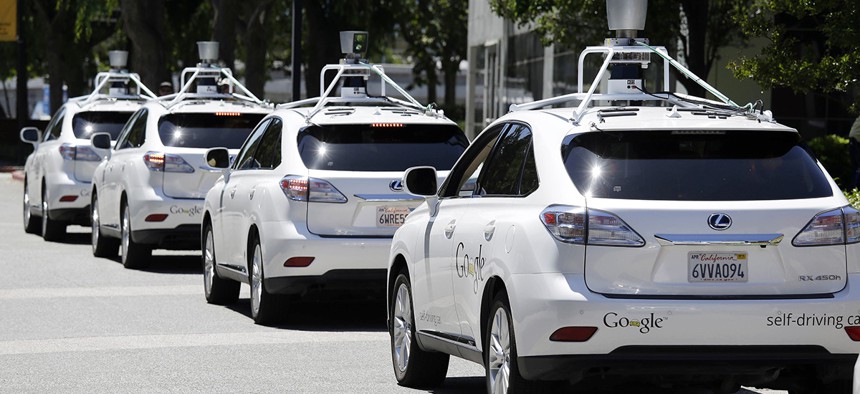Lawmakers Want Self-Driving Cars To Thrive But Still Fear Hacks

A row of Google self-driving Lexus cars at a Google event outside the Computer History Museum in Mountain View, Calif. Eric Risberg/AP File Photo
Despite positives, manufacturers still face concerns that cars could be hijacked.
In a House hearing Tuesday, lawmakers extolled the many potential benefits of self-driving cars, including fewer traffic deaths and transportation options for the blind, elderly or disabled.
It was the first meeting of the House Energy and Commerce Subcommittee on Digital Commerce and Consumer Protection, during which lawmakers probed witnesses from auto manufacturers about how realistic—and how far off—a network of autonomous vehicles might be. They also attempted to strike a balance between advocating for heavier regulation of the industry to protect both the physical safety and privacy of passengers and allowing autonomous vehicles to flourish uninhibited.
» Get the best federal technology news and ideas delivered right to your inbox. Sign up here.
"We should never let an unsafe or unproven vehicle hit the road," Rep. Debbie Dingell, D-Mich., said.
The vision of widespread self-driving cars might not be realized without Congressional help. The Senate Commerce, Science and Transportation Committee Chair John Thune, R-S.D., and Sen. Gary Peters, D-Mich., announced plans Tuesday to eventually introduce legislation that promoting the autonomous vehicle industry.
Today's federal safety standards involve concepts such as the "placement of driver controls" that "assume a human operator," they wrote in a statement. "While these requirements make sense in today’s conventional vehicles, they could inhibit innovation or create hazards for self-driving vehicles." They also plan to examine the "existing patchwork of laws and regulations and the traditional roles of federal and state regulators.”
The bill they plan to introduce would join another bill, the Security and Privacy In Your Car Study Act, or SPY Car Act, re-introduced in the House last month, that would require the National Highway Traffic Safety Administration to study cybersecurity standards for cars, including autonomous ones.
During the House hearing, witness Nidhi Kaira, a senior scientist at RAND Corporation, noted that hacking is a "very real threat. ... It’s not only hacking for fun and profit but autonomous vehicles provide an avenue for terrorism."
"The threat is no longer suicide bombers ... now we have vehicles that can drive around," she added.
It's a topic that has irked lawmakers for years: In a 2015 House Oversight hearing on autonomous vehicles, members cited a report from Wired that described how researchers were easily able to take control of the author's car.
On Tuesday, witnesses told lawmakers that it'll be years before they test and deploy fully autonomous cars.
"We don’t have a specific date for when we’re going to remove the driver from the car,” Toyota Research Institute Chief Executive Officer Gill Pratt testified. He said the company plans to test models until it makes sense to remove the driver. Volvo plans to deploy and test them by 2021, its Vice President of Government Affairs Anders Karrberg said. Volvo also plans to analyze hundreds of thousands of crash case studies and use simulations to prepare the cars for as many accident scenarios as possible.
And there some etiquette issues that need to be explored, Rep. Gregg Harper, R-Miss., suggested. "Let's say you got your driver out of the self-driving car ... I'm driving along and I come across it, and I honk my horn. Will it do any good?"
"We haven't reached that point of deciding how and whether it would be appropriate for vehicles to react, and in what way, to honking a horn," Mike Abelson, General Motors' vice president for global strategy, said.


